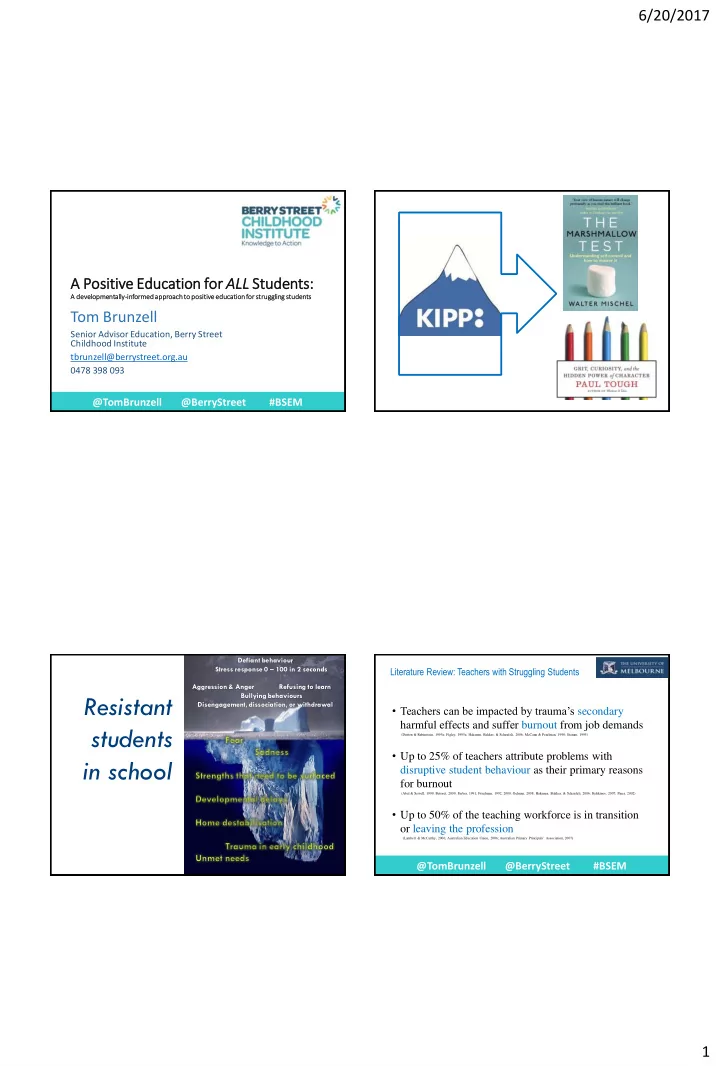

6/20/2017 A Pos osit itive Education for or ALL LL Stu tudents: A developmentall lly-in informed approach ch to posit itive educatio ion for strugg gglin ling g students Tom Brunzell Senior Advisor Education, Berry Street Childhood Institute tbrunzell@berrystreet.org.au 0478 398 093 @TomBrunzell @BerryStreet #BSEM Defiant behaviour Stress response 0 – 100 in 2 seconds Literature Review: Teachers with Struggling Students Aggression & Anger Refusing to learn Resistant Bullying behaviours Disengagement, dissociation, or withdrawal • Teachers can be impacted by trauma’s secondary harmful effects and suffer burnout from job demands students (Dutton & Rubinstein, 1995a; Figley, 1995a; Hakanen, Bakker, & Schaufeli, 2006; McCann & Pearlman, 1990; Stamm, 1995) • Up to 25% of teachers attribute problems with in school disruptive student behaviour as their primary reasons for burnout (Abel & Sewell, 1999; Betoret, 2009; Farber, 1991; Friedman, 1992, 2000; Gelman, 2008; Hakanen, Bakker, & Schaufeli, 2006; Kokkinos, 2007; Pines, 2002) • Up to 50% of the teaching workforce is in transition or leaving the profession (Lambert & McCarthy, 2006; Australian Education Union, 2006; Australian Primary Principals’ Association, 2007) @TomBrunzell @BerryStreet #BSEM 1
6/20/2017 My research suggests that when In our campuses, we need to balance potentially confusing or opposite over-arching polarities: teachers implement trauma-informed positive education Continuum 1: as pedagogical strategies, 3 things occur: Student outcomes (i.e., 2-years reading growth in 1-year) Teacher workplace wellbeing Developmentally 1. Regulatory capabilities Age respectful 2. Relational attachments Trauma- appropriate Transformed 3. Wellbeing domains (i.e., PERMA) Informed understandings of pedagogical Positive approach Education Teacher personal wellbeing 1. Regulatory capabilities 2. Relational attachments 3. Wellbeing domains (i.e., PERMA) @TomBrunzell @BerryStreet #BSEM CON ONSIDER a st strug ruggling ng young ng perso son n that t you work rk with: h: STRA TRATEGIES for or Teac eachers PHYSICAL needs Shame • Determine the unmet need the SPIRITUAL needs EMOTIONAL needs Impulses Trust TRAUMA’S student is trying to meet. EFFECTS Stress Empathy ENERGETIC needs COGNITIVE needs @TomBrunzell @BerryStreet #BSEM 2
6/20/2017 In our campuses, we need to balance potentially confusing or opposite over-arching polarities: Continuum 2: STRA TRATEGIES for or Teac eachers • Reframe every conversation, especially Predictable difficult conversations, as an rhythm & Flexibility opportunity to build the relationship . structure @TomBrunzell @BerryStreet #BSEM @TomBrunzell @BerryStreet #BSEM Brunzell, T., Stokes, H., & Waters, L. (2016). Trauma-Informed Positive Education: Using positive psychology to strengthen vulnerable students. Contemporary School Psychology, 20 , 63-83. In our campuses, we need to balance potentially confusing or opposite over-arching polarities: Continuum 3: Developmental practice for students and staff Capacity Willingness @TomBrunzell @BerryStreet #BSEM @TomBrunzell @BerryStreet #BSEM 3
6/20/2017 In our campuses, we need to balance potentially confusing or opposite over-arching polarities: STRA TRATEGIES for or Teac eachers Continuum 4: • Determine if the student is struggling due to a capacity to Care/Service Care/Service to others to self engage or a willingness to engage. @TomBrunzell @BerryStreet #BSEM @TomBrunzell @BerryStreet #BSEM Balancing the Scale STRA TRATEGIES for or Teac eachers • Pause. Breathe. Connect to your values of empathy and compassion; and consider Compassion Compassion satisfaction the relationship to the self as one framed fatigue by unconditional positive regard. (Stamm, 1995, 2005) @TomBrunzell @BerryStreet #BSEM @TomBrunzell @BerryStreet #BSEM 4
6/20/2017 Publications: STRA TRATEGIES for or Teac eachers Brunzell, T., Stokes, H., & Waters, L. (2016). Trauma-informed flexible learning: Classrooms that strengthen regulatory abilities. International Journal of Child, Youth and Family Studies, 7, 2, 218-239. DOI: 10.18357/ijcyfs72201615719 Brunzell, T., Stokes, H., & Waters, L. (2016). Trauma-Informed Positive Education: Using positive psychology to strengthen vulnerable students. Contemporary School Psychology, 20 , 63-83. DOI: 10.1007/s40688-015-0070-x 1. Determine the unmet need the student is trying to meet. Brunzell, T., Waters, L., & Stokes, H. (2015). Teaching with strengths in trauma-affected students: A new approach to 2. Reframe every conversation, especially difficult conversations, healing and growth in the classroom. American Journal of Orthopsychiatry , 85, 1 , 3-9. as an opportunity to build the relationship . Brunzell, T., Stokes, H., & Waters, L. ( in progress ). Teachers and secondary traumatic stress: Exploring the impacts on teacher practice and workplace wellbeing. 3. Determine if the student is struggling due to a capacity to engage or a willingness to engage. Brunzell, T., Stokes, H., & Waters, L. ( in progress ). Meaningful work for trauma-informed teachers: Identifying understandings of meaningful work in teacher practice and workplace wellbeing. 4. Pause. Breathe. Connect to your values of empathy and Brunzell, T., Stokes, H., & Waters, L. ( in progress ). Teaching wellbeing strategies to bolster academic learning within compassion; and consider the relationship to the self as one trauma-informed practice. framed by unconditional positive regard. @TomBrunzell @BerryStreet #BSEM @TomBrunzell @BerryStreet #BSEM 5
Recommend
More recommend